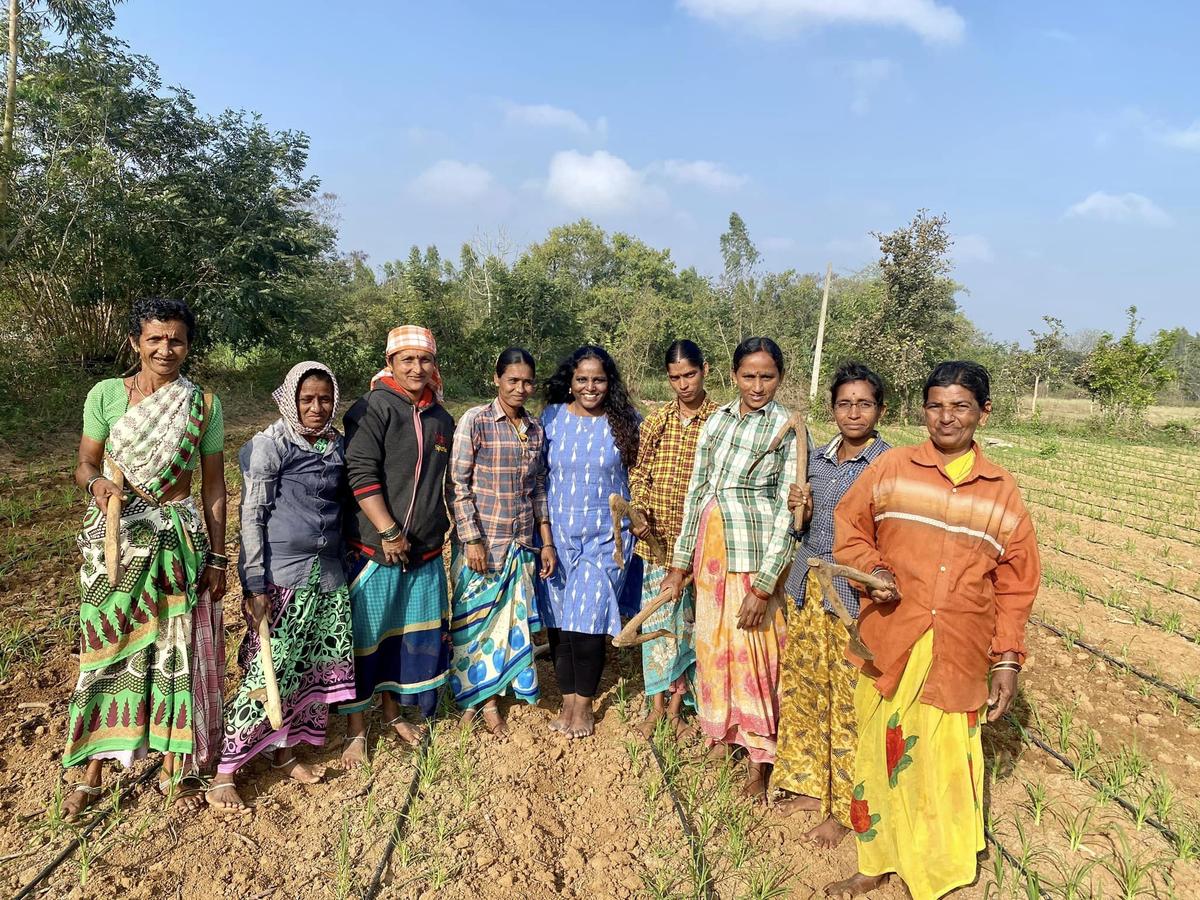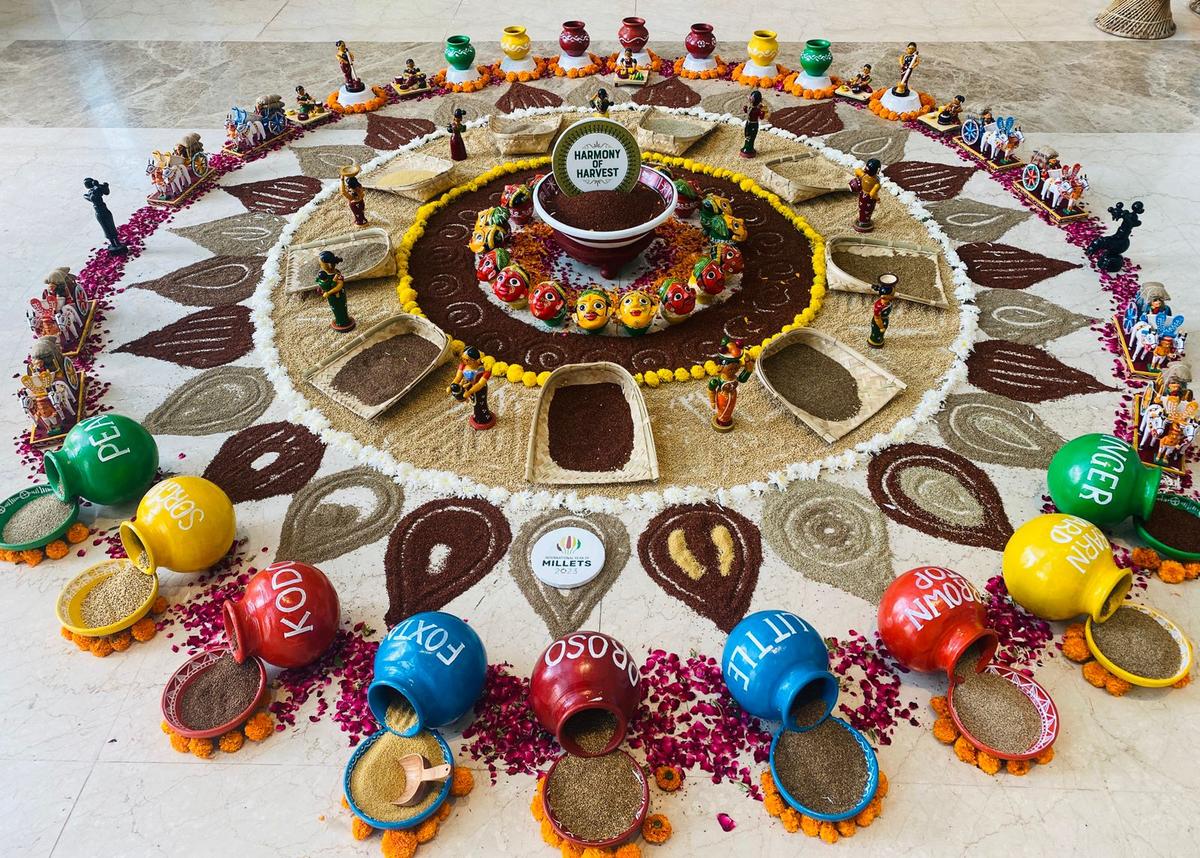Hyderabad-based entrepreneur Vishala Reddy Vuyyala has announced Decode Millet, a 16-month project that aims to connect with a million corporate sector employees in eight cities. Through presentations, fun cooking sessions and pop-ups, she hopes to motivate more people to shed their resistance to consuming millets. “The year 2023, observed as the International Year of Millets, saw the active participation of start-ups and micro-processing units, which benefited everyone in the value chain including farmers and producer organisations. There is a need to sustain the momentum for at least five years to ensure continuous consumer engagement,” says Vishala, who founded Millet Bank and Minkan Agro Industries Pvt Ltd (with Priyanka Barathwaj).
Decode Millet plans to reach employees of 150 corporate houses in Hyderabad, Bengaluru, Delhi NCR, Chennai, Kolkata, Pune, Mumbai and Ahmedabad. “There have been focussed studies on the health risks faced by the corporate sector, especially the IT sector, owing to their lifestyles and we believe that consuming millets can help promote better health. I discovered that a leading IT campus has nearly 80,000 employees. So this is an ideal sector to take the millet discourse forward,” says Vishala, adding that the first step is to try and remove the notion that millets are not tasty.
Millets and Rayalaseema

Vishala Reddy (centre) will millet farmers
| Photo Credit:
Special Arrangement
Vishala’s journey into the millet business began during the lockdown. Millets, however, are not new territory. She grew up in the agrarian belt of Kuppam in Chittoor district, Andhra Pradesh. “This drought-prone belt of Rayalaseema has been traditionally conducive to growing ragi (finger millet), jowar (sorghum), hello (little millet) and arikelu (kodo millet), with pulses and nuts from which oil is extracted. I have witnessed the seeding-to-feeding process.”
In 2020, when Vishala visited her sister, who was growing a small patch of millets, she was surprised to learn that a kilogram of grains was being sold to traders at ₹15. “Growing and harvesting millets is a labour-intensive process and such small returns did not make sense.”

Vishala also observed that unlike a few decades ago, several farmers in the villages and tribal regions had moved away from growing and consuming millets. She was aware of the efforts of MCV Prasad (who established Prakruthivanam) and food scientist Khader Vali, who actively continue to promote cultivation and consumption of millets, and wanted to do her bit. She makes a case for millets by stating, “Internationally, the growing rates of obesity and micronutrient-deficiency prompted several countries to think of traditional grains. There is also the challenge of feeding an ever-increasing population. Rice and wheat rely heavily on water while millets are easier to grow on arid land.”
Grains and crafts
The arid Rayalaseema belt is conducive to growing millets
| Photo Credit:
Special Arrangement
When Vishala began doing the groundwork for a millet start-up, it brought back childhood memories. “Farming and traditional crafts went hand in hand; craftspeople periodically made bamboo baskets and the chata (winnowing basket) before they were replaced with plastic ones. Along with millet products, I also wanted a line of traditional crafts.”
Before discussing millets and crafts further, Vishala shares anecdotes from childhood, which involved travelling extra miles for primary education. “I was the first girl in our village to complete school and college.” Being the sister of a sarpanch helped, to an extent, to rise above gender restrictions. “Our village had one government primary school and it admitted only boys. So I would walk to the co-education school at the mandal headquarters, five kilometres away. In Class X, they let me ride a bicycle.”
The nearest college was in Kolar district, more than 50 kilometres away. She took up a course in sericulture but opted out after a year, when her mother was diagnosed with cancer. “I pursued a distance education course in political science, public administration and sociology (from BR Ambedkar Open University). Studying from home helped me take care of my mother. Since I was the only one in the family who could speak some English, I would take my mom to the hospital in Bengaluru for treatment.”
Her formative years explain the tenacity with which she worked later. She also completed an MBA programme from Osmania University. “For the next several years I worked in the business event management sector and travelled to 25 countries.”
Alongside event management, she conducted workshops in behavioural change for different sectors. “But I felt the need to do something more concrete. Getting into the millet business and being able to help the farmers filled that void.”
Reviving millets

A file photo of an arrangement done by Millet Bank to mark International Year of Millets 2023
| Photo Credit:
Special Arrangement
In her native home in the village, the shed that was once used for sericulture lay vacant. Vishala used the space to store seeds and began working towards reviving millet cultivation in the neighbourhood. “We got several other farmers into the fold. Since I am active on social media, I would share our initiatives and people came forward to invest. We formally began Millet Bank in 2021.”

There were several learnings. She observes that there are not enough millet processing units in Andhra Pradesh and Karnataka. “We began selling our harvest to traders in the nearby districts and Bengaluru, of course for a better price than earlier, and also encouraged more farmers to get back to consuming millets. For Millet Bank products, I rely on processing units in Coimbatore, Madurai and Thiruchengodu. They have some of the best processing units and understand millets better. It was not pragmatic to send one or two lorry loads of the millets from our harvest all the way to Tamil Nadu for processing, so I began sourcing the grains for Millet Bank products from Tamil Nadu.”
Ragi, jowar, little millet and kodo millet have been traditionally grown in Rayalaseema
| Photo Credit:
Special Arrangement
Millet Bank began with cookies and expanded to noodles, idli, dosa and cake mixes among other products. Simultaneously, Vishala launched a crafts line named Krisayu Gifting that sources traditional craft accessories for individual and corporate gifting.
Vishala participated in events conducted as part of the International Year of Millets in 2023, including the G-20 summit, and the Millet Convention conducted by The Hindu Business Line.
Moving forward, she hopes to establish millet processing units in Andhra Pradesh and Telangana.






